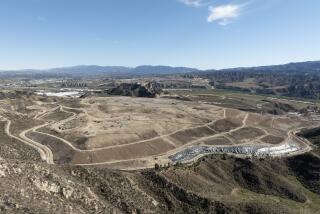California launches internal audit over Cabazon toxic waste facility
- Share via
Reporting from Mecca, Calif. -- California environmental regulators have launched an internal audit to determine why their agency sanctioned a Coachella Valley recycling facility to accept tons of toxic waste that, in part, was the source of noxious odors that sickened children at a nearby elementary school.
The recycling company, Western Environmental Inc., was ordered by the U.S. Department of Environmental Protection in May to cease accepting hazardous materials, drain an uncovered oil pond and reduce two four-story mountains of contaminated soil on the site. The company operates on reservation land owned by the Cabazon Band of Mission Indians.
The state Department of Toxic Substances Control had listed the Western Environmental facility as an acceptable disposal site for toxic materials, which was first reported in the Riverside Press-Enterprise. Soil contaminated with petroleum or heavy metals has been shipped to the remote desert recycling facility by the Los Angeles Unified School District, Caltrans, Camp Pendleton and other government agencies.
Western Environmental never received a state permit from the department to accept the contaminated material. The facility is exempt from state environmental regulations because it is on the Cabazon reservation, a sovereign nation. In May, the state ordered waste haulers not to take toxic materials to the facility.
“I’ve asked for an independent audit of our procedures, because I want to understand how it happened and how we can prevent it in the future,” said Debbie Raphael, director of the toxic control department.
U.S. Sen. Barbara Boxer (D-California) on Thursday provided an update on the investigation to concerned parents and educators at Saul Martinez Elementary School, which has been overwhelmed by the noxious odors. Boxer said community outrage led to swift action by state and federal environmental regulators.
“The problem we’re having with Mecca, the sickening air pollution, has been solved because everyone that got involved in this community insisted on making a difference, insisted on speaking up,” Boxer said at a news conference at the school.
Jared Blumenfeld, the EPA’s regional administrator in California, said an investigation identified Western Environmental as the primary source of the noxious odors, which have been powerful enough to send teachers to the hospital and sicken schoolchildren. Unlike the state, the EPA has the authority to enforce federal environmental laws on tribal land.
Once the source of the odors was identified, Cabazon tribal officials joined with regulators to order the company to eliminate the source of the odors, including covering the massive mounds of contaminated soil on the site and removing truckloads of soy whey dumped at the facility.
Blumenfeld said the investigation is continuing and that some odors remain.
Cabazon Tribal Chairman David Roosevelt, who appeared with Boxer at Thursday’s event, said the tribe is in discussions with regulators to ensure that state environmental laws can be observed on the reservation. Roosevelt has offered to have the tribal government adopt and enforce environmental regulations that mirror state law but said he is opposed to sacrificing the tribe’s sovereign rights by opening the reservation to state enforcement.
“We want and have taken action to make sure this doesn’t happen again … but we want to protect our rights too,” he said.
Community members and school officials said they were thankful that environmental regulators took action but remain concerned about the hazards that remain.
“Things have been getting better, but nonetheless, we’re still not satisfied,” said school Principal Delia Alvarez.
More to Read
Sign up for Essential California
The most important California stories and recommendations in your inbox every morning.
You may occasionally receive promotional content from the Los Angeles Times.











